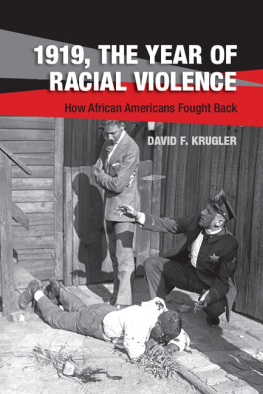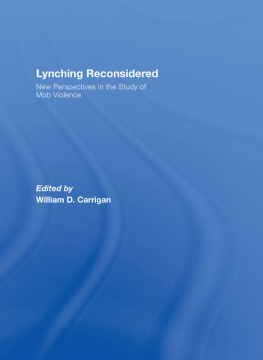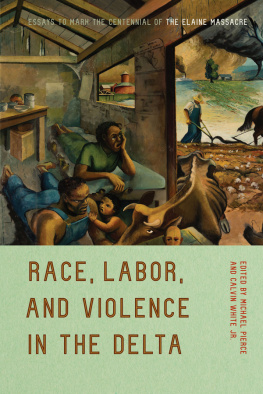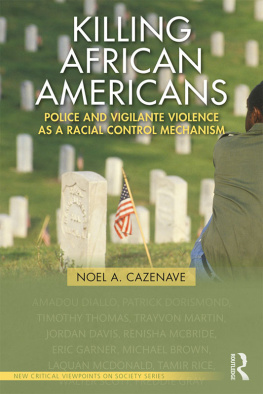1919, The Year of Racial Violence
How African Americans Fought Back
This study recounts African Americans brave stand against a cascade of mob attacks in the United States after World War I. The emerging New Negro identity, which prized unflinching resistance to second-class citizenship, inspired veterans and their fellow black citizens. In city after city Washington, D.C.; Chicago; Charleston; and elsewhere black men and women took up arms to repel mobs that used lynching, assaults, and other forms of violence to protect white supremacy; yet, authorities blamed blacks for the violence, leading to mass arrests and misleading news coverage. Refusing to yield, African Americans sought accuracy and fairness in the courts of public opinion and the law. This is the first account of this three-front fight in the streets, in the press, and in the courts against mob violence during one of the worst years of racial conflict in U.S. history.
DAVID F. KRUGLER is Professor of History at the University of Wisconsin-Platteville. He is the author of The Voice of America and the Domestic Propaganda Battles, 19451953 (2000) and This Is Only a Test: How Washington, D.C., Prepared for Nuclear War (2006).
1919, The Year of Racial Violence
How African Americans Fought Back
David F. Krugler
University of Wisconsin-Platteville
32 Avenue of the Americas, New York, NY 10013-2473, USA
Cambridge University Press is part of the University of Cambridge.
It furthers the Universitys mission by disseminating knowledge in the pursuit of education, learning, and research at the highest international levels of excellence.
www.cambridge.org
Information on this title: www.cambridge.org/9781107639614
David F. Krugler 2015
This publication is in copyright. Subject to statutory exception and to the provisions of relevant collective licensing agreements, no reproduction of any part may take place without the written permission of Cambridge University Press.
First published 2015
Printed in the United States of America
A catalog record for this publication is available from the British Library.
Library of Congress Cataloging in Publication Data
Krugler, David F., 1969
1919, the year of racial violence : how African Americans fought back / David F. Krugler, University of Wisconsin, Platteville.
pages cm.
Includes bibliographical references and index.
ISBN 978-1-107-06179-8 (hardback) ISBN 978-1-107-63961-4 (pbk.) 1. United States Race relations History 20th century. 2. African Americans History 18771964. 3. African Americans Violence against History 20th century. 4. African Americans Social conditions 20th century. 5. Race riots United States History 20th century. 6. Lynching United States History 20th century. 7. Racism United States History 20th century I. Title.
E185.5.K782014
305.8009730904dc23 2014024993
ISBN 978-1-107-06179-8 Hardback
ISBN 978-1-107-63961-4 Paperback
Cambridge University Press has no responsibility for the persistence or accuracy of URLs for external or third-party Internet Web sites referred to in this publication and does not guarantee that any content on such Web sites is, or will remain, accurate or appropriate.
To Eric Pullin, friend and fellow historian
Acknowledgments
Books and their authors travel a long journey from idea to print. To my good fortune, a host of generous people have aided me during my trek, from my first thoughts on the books subject to the final proofreading mark.
Professor Juliet E. K. Walker, now at the University of Texas, kindled my interest in African American history while I was a graduate student at the University of Illinois, and she taught me to think and read like a historian.
At the University of Wisconsin-Platteville, department chair Paula Nelson and college dean Mittie Nimocks Den Herder enthusiastically supported my 20072008 sabbatical. I also appreciate Mitties endorsement of my application to the Institute for Research in the Humanities. Grants from UW-Platteville and the UW System Institute on Race and Ethnicity funded research trips. Paula Nelson and Carl Allsup wrote letters of recommendation. Kathy Lomax pointed me toward relevant fellowships. I am grateful to Elizabeth Throop, Dean of the College of Liberal Arts and Education, for providing a stipend for the costs of the books images. Department chairs J. Elmo Rawling III and Nancy Turner approved grant applications and conference travel reimbursement. Becky Savoy helped me collect image permissions.
I benefited in more ways than I can count from the help of archivists, librarians, and scholars across the United States. At UW-Plattevilles Karrmann Library, Lori Wedig cheerfully fulfilled my Universal Borrowing requests. Orville D. Menard shared his notes and thoughts on Tom Dennison and Omahas 1919 riot. Stephanie Bayless handled my duplicating and photographic requests at the Butler Center for Arkansas Studies. Staff at the Harold Washington, Sulzer, and Woodson Libraries in Chicago helped me get through dozens of microfilm reels. Jane Aldrich and Molly French made copies for me in Charleston, South Carolina; Linda Piper sent materials from the Longview (Texas) Public Library. Marquette University Archivist Matt Blessing sent me a copy of Arthur Fallss memoir. For all their help, I want to acknowledge Doris Martinson, Knox County (Tenn.) Archives; Stephen G. McShane, Calumet Regional Archives, Indiana University Northwest; Gary R. Rosenberg, Douglas County (Neb.) Historical Society; Dennis Mihelich, history professor emeritus, Creighton University; Eric Yellin, associate professor of history, University of Richmond; Alan Lessoff, professor of history, Illinois State University; Daniel Greene, vice president for research and academic programs, Newberry Library; Joanne Ferguson Cavanaugh, Omaha Public Library; Faye Haskins, District of Columbia Public Library; Matthew Gilmore, H-DC editor; Joellen ElBashir, Curator, Moorland-Spingarn Research Center at Howard University; and the staffs of the Newberry Library, Wisconsin Historical Society, Library of Congress, Chicago History Museum, and the National Archives in Washington, D.C., and College Park, Md. Thanks are due to Arthur Waskow, Grif Stockley, and Theodore Kornweibel, Jr., for donating their invaluable research materials to publicly accessible archives. Rachel Rooney and Brodie Austin, of the Newberry Librarys Professional Development Programs for Teachers, invited me to lead several symposia on Chicagos 1919 race riot. I am grateful as well for the help of the Chicago-area teachers who took part in these symposia, especially Patricia Boughton, Greg Simmons, and Mike Torney. For their suggestions, I want to thank Laurie Matheson and Joe Spieler.
Historical conferences and lecture engagements offered opportunities to present my research to diverse audiences. At the 2007 Annual Conference on Washington, D.C., Historical Studies, Bell Clement, Maurice Jackson, Jefferson Morley, and Dana Schaffer provided helpful feedback. Thanks are due to Jonathan Coit for organizing a panel for the 2011 Annual Meeting of the Organization of American Historians and to Charles Lumpkins, Gregory Mixon, and Delia Mellis for their comments and advice. I appreciate the invitation from David Tucker and John Moser of Ashland University to give a Summer Institute lecture in 2011 for the Master of Arts in American History and Government program. Amy Parsons was a perceptive respondent when I delivered an address for the College of Liberal Arts and Educations Faculty Forum Series at UW-Platteville.







